The days of CRM being a tool exclusively for sales managers are long gone.
Modern CRM solutions are significantly more sophisticated and can satisfy the needs of different teams within a company. There's CRM functionality to streamline sales and marketing, customer service, and even C-Suite processes.
This is the first article in the not just for sales CRM series.
We’ll cover the benefits of using a CRM for marketing agencies and cover specific use-cases of CRM software for marketing.
Read till the end of this blog post to find out how to use CRM data for more effective marketing to boost your sales and, therefore, help you grow your business.
Use CRM data to create a more accurate Ideal Customer Profile
In an ideal world, marketers have enough time to develop a different strategy for each segment of their audience, appealing to them all with a hyper-personalised approach.
Unfortunately, the world we live in is far from perfect. Modern B2B companies tend to have a wide range of potential customers, but not the marketing means to meet their specific niche concerns.
At the end of the day, marketers, no matter how professional, aren't almighty. They can’t lure in every potential customer who could benefit from the company’s product.
The marketing department needs to focus its efforts on the most valuable segments of a business in terms of customer lifetime and revenue generated.
The starting point for attracting high-value customers is knowing who they are; developing a robust Ideal Customer Profile (ICP) is the ground base of any marketing strategy.
An Ideal Customer Profile is a detailed breakdown of a customer that would get the most value out of your product or service and would be the best fit for your company. An ICP outlines both firmographic and behavioural characteristics which lucrative customers share.
By clarifying the following questions, a clear ICP can improve your marketing strategy, from content creation and advertising to lead generation…
- What type of messaging resonates best with customers?
- What helps put across your value proposition?
- What prevents your customers from making a purchase?
- What values, desires, pain points, and processes are common among your best customers?
To find answers to all these questions, look at your pool of existing customers. Spot the best, most valuable ones and see what they have in common.
As a single storage of all customer data, CRM software helps marketers access all the information regarding past deals, pick out the best customers, and see what they have in common, including…
- Industry. Is there a specific industry in which most of your best customers operate?
- Company size. The average number of employees your best customers have
- Location. Where your best customers are in the world.
- Company age. Start-up companies or already-established?
- Budget. Do these companies share similar budgets?
- Company status. Are your customers for-profit or non-profit?
- Key decision-makers. Who makes the purchase decisions?
- Key business processes. How do they do business? What problems are they trying to solve?
- Tech stack. What other solutions do they use?
- The user persona and buyer persona. Who’s using the product, and who’s the first point of contact?
You can also access the history of communication between customers and sales reps, uncovering which messages resonate best, the stage of the buyer’s cycle at which your customers entered the sales funnel, and the rest. Plus, CRM helps you align sales & marketing and ensure they're following one unified strategy.
Use CRM to personalise customer experience
Customers are increasingly aware of the amount of data companies collect about them throughout the buyer’s journey. Data is the new oil. It’s essential, and customers want to get something in return for it.
"Up to 66% of consumers expect that brands use the data they gather to understand their leads’ individual needs and adjust their offers — both product and content — accordingly"
If you fail to provide customers with the content they’re interested in, you might as well ditch the marketing activities altogether. Inevitably, leads choose a competitor if they feel like you don’t understand them.
A CRM system can help you appeal to potential customers, hitting them with the right content at the right time. Hyper-personalisation of marketing efforts becomes possible thanks to in-depth audience segmentation.
When you capture a new lead, make sure you fill out their CRM contact record with all the relevant information. This can include…
- First name and last name
- Job title
- Location
- Content preferences
- Lead source
- Where they entered the sales funnel
You can add custom tags to further segment your audience.
For instance, you could group your contacts based on how they prefer to interact with your business (email, messages, telephone), which types of messages they are most receptive to (would they react better to use cases or social proof), where they are in their buyer’s journey (are they looking for the top of the funnel or the bottom of the funnel content?).
With NetHunt CRM, audience segmentation is easy. Let me show you how to do it.
Let’s imagine you want to send an email to every CEO of a business that’s your partner. To do this, you need to create a segmented view. Each contact record, filled out correctly, should contain a field with their job position, and their customer status.
- Filter by status, partner; filter by position, CEO.
- Save the custom view
- Target this segment with personalised bulk email campaigns whenever you need to. The segment automatically updates whenever a new contact is added to the database.
To find out more about how to personalise communication using CRM data, check out this article!
Use CRM to assess the effectiveness of different marketing channels
The omnichannel approach is one of the hottest marketing trends.
Consumers want a continuous brand experience across different platforms and channels. At the same time, companies of all calibres want to increase their online and offline, improving their brand visibility and developing better chances of getting through to their audience. This leads marketers to use several different channels to generate leads and nurture them.
Unfortunately, not all channels are as fruitful as others.
Marketers can use CRM software to assess the effectiveness of their marketing channels and identify the best-performing ones.
To this end, implement a referrer field for every new lead that enters your CRM database.
Then, build pipelines in CRM to see which channels generate the most leads, and how well leads coming from different channels convert.
This helps you understand which channel is the most effective in terms of generating leads and which generates the most high-quality leads.
Analysing the performance of your marketing channels can also help you assess the quality of the content shared via each channel and make changes to it where necessary.
For best results, measure the number of leads generated by each channel during a certain period of time. Then, compare and contrast those reports to see the dynamic.
Check out the views you need to set up in a CRM for your marketing team.
Use CRM to aid effective email marketing
The majority of modern CRM solutions offer email marketing functionality.
NetHunt CRM helps you with the following email marketing tasks…
- Compose and save email templates. NetHunt CRM allows you to import, save, and share HTML templates, as well as create canned responses. Mail merge and macros.
- Send emails in bulk using Gmail or custom SMTP.
- Track email campaign stats. Stay on top of your email campaigns by tracking open rates, click-through rates, bounce rates, unsubscribes, and spam reports. Know the exact moment a lead opens an email.
- Mass update your contacts. Bulk-unsubscribe or bulk-update contacts based on email campaign results.
- Send follow-up email campaigns. Segment your contact lists based on campaign results, then send follow-up campaigns to the most relevant leads.
Once you segment your audience, you can send targeted email campaigns like...
- Product newsletter for product users
- A ‘feature release’ newsletter for product users and leads at the bottom of the sales funnel
- Gated content for top of the funnel leads
- Online event invitations
Finally, you can also enjoy the benefits of email marketing automation. CRM software like NetHunt CRM allows users to send out trigger-based email sequences to nurture leads.
One of the best advantages of using a CRM system with email marketing functionality over an email marketing tool is that the former allows you to see the impact your email marketing campaigns make on your sales pipeline straightaway.
For example, NetHunt CRM lets you see your lead’s entire emailing history at a glance. The total number of email campaigns they received, which emails were opened, clicked or reported as spam, whether or not they completed the CTA, and if they moved down the funnel are all data points accessible within a couple of clicks.
Use CRM for PR activities
Mentions in the industry- and niche-specific product articles, publications in media, and native promotions by the thought leaders are all popular marketing tools in the world of B2B.
But as the markets in this business sector are getting more and more saturated, it becomes more challenging to get those publications as native promotion. For the aforementioned tools to remain accessible, marketers need to build rapport with different media and individual influencers.
The same way CRM isn’t just a tool for the sales department, CRM is also not just a tool for managing relationships with leads and customers. Marketers can easily use CRM software to build stronger relationships with influencers, journalists, and partners.
- Create a separate folder for PR groups and tag PR contacts as necessary
- Set up a PR pipeline (in the same way you’d set up a sales pipeline)
- Keep tabs on communication easier with different PR groups this way
Keep an eye on the progress of every communication, send kind nudges and follow-ups to speed up the process, and celebrate every new publication.
You can also use the CRM to mark any important dates such as anniversaries, birthdays, or upcoming holidays. Build good relationships by congratulating these groups when the date comes.
Use CRM for lead engagement
Speaking of keeping contacts engaged…
If you want to increase your brand awareness and increase sales, you need to always stay on top of your lead’s or customer’s mind. This is only possible if you’re in a continuous conversation with them, maintaining their engagement.
As a busy marketer, you don’t need to keep track of every lead or customer in your contact database manually. Instead, you can leverage the benefits of automation functionality and delegate this task to a CRM system.
Configure specific events for lead engagement. For example…
After X days from the moment of registration/trial/purchase, invite your lead/customer to a webinar, then send them tips, then offer a demo.
or...
After X days from the moment your lead signs up to your marketing newsletter, hit them with an exclusive free e-book/guide offer, then reach out to them with a demo offer.
Use CRM to assess marketing activities and make data-driven decisions
Finally, you can use your CRM software to analyse the effectiveness of marketing activities, see which ones perform well and can be scaled, and which ones are underperforming and need to be reviewed.
For instance, you can build a marketing pipeline report to find out the status of all of your leads within a specific time period. How many leads are qualified? How many are in the nurturing stage? How many are close to being sales-ready?
On top of that, you can measure the return on investment (ROI) of your marketing campaigns.
Tag all the leads a particular campaign brings into the sales funnel, then build a sales pipeline with these leads, and see the value size of deals in the Won stage. Then compare the cumulative sales made against the cost of the campaign.
Based on this information, you can make data-driven decisions when planning your future campaigns and overall marketing strategy.
While CRM software is an irreplaceable tool for sales management, marketers can benefit from using it too.
We’ve only explored the most prominent possibilities CRM systems provide marketers with.
Really, there are several, possibly infinite, more use cases for marketing specialists working in different industries, promoting different products and services.
If you want to find out how NetHunt CRM can help your specific business with its sales and marketing activities, make sure you book a demo call with our lovely Customer Success Team.




















 product experts — let's find the best setup for your team
product experts — let's find the best setup for your team